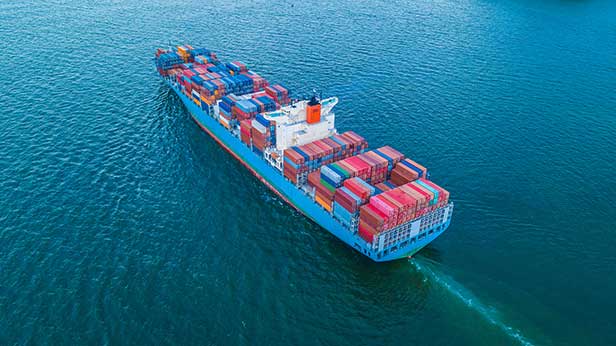April 16, 2020
New China Rules Delay PPE Exports
Importers in the promo industry have reported some minor delays due to the regulations, as well as holdups because of limited airfreight capacity.
China’s new restrictions on exports of medical supplies and personal protective equipment (PPE) are causing bottlenecks that are delaying getting the products to the U.S. at a time when they’re sorely needed amid the country’s coronavirus pandemic, according to the The Wall Street Journal and other media reports.

A container cargo ship carries exports from China.
Some importers in the promotional products industry say they’ve experienced PPE import delays, which have also, promo pros note, resulted from airfreight challenges.
With promo sales plummeting due to societal shutdown measures resulting from COVID-19, many industry suppliers and distributors across the country have pivoted to selling PPE to help in the fight against the virus and to keep some revenue flowing into their businesses.
China makes more than 40% of the world’s imports of masks, gloves, goggles, visors and medical garments, according to the Peterson Institute for International Economics.
Earlier this month, China’s government enacted policies that officials there say are intended to assure that medical product exports are quality and meet standards, while also ensuring that necessary items China needs for its coronavirus fight aren’t sent abroad.
The policies, however, have created logjams, leaving products like face masks, respirators, ventilators and COVID-19 test kits temporarily stranded in China and disrupting “established supply chains for medical products just as these products were most needed for the global response to COVID-19,” according to a U.S. State Department memo cited by The Wall Street Journal.

Yuhling Lu, Ariel Premium Supply
Delays tied to the new regulations appear to be occurring mainly with PPE items that are specifically classified as medical grade/for medical use, according to importers in the promo industry with which Counselor spoke. St. Louis, MO-based Ariel Premium Supply (asi/36730), a Top 40 promo supplier, said her company began experiencing delays on medical-grade face mask imports in early April without any advance notice.
“There is a backlog of about a week for the medical face masks to clear Chinese customs, but they do clear,” said Ariel CEO Yuhling Lu, a member of Counselor’s Power 50, a ranking of the most influential people in the promotional products industry.
Lu explained that Chinese customs is required to do stricter paperwork reviews for nearly all PPE shipments. “If the shipment is labeled for ‘civilian’ or ‘not for medical use,’ it tends to go through more quickly,” said Lu. “None of our shipments for KN95 masks have experienced this delay.”
KN95 masks are not considered for medical use, even though federal authorities in the U.S. recently relaxed rules on their use in medical settings, due to the shortage of U.S. standard N95 masks.
The various standards related to medical-grade PPE can feel dizzyingly complex. “The medical masks have to pass different performance standards, and there are different definitions and levels of ‘medical,’ ” Lu noted. “For example, surgical rooms have different standards than general procedure areas.”
Jeff Lederer, president of Prime Line (asi/79530), the hard goods division of promo’s largest supplier alphabroder (asi/34063), said he’s aware there have been delays with importing medical grade masks, gowns and face shields because of the new regulations in China. Still, Prime Line hasn’t experienced these because it has eschewed medical-grade imports and focused on providing non-medical masks, goggles and disposable gloves. “We’ve also begun production of non-woven masks in our production facilities to offer customers Made-in-the-USA from imported materials with a logo,” said Lederer.
Beyond the new export restrictions, U.S. promo companies that import from China say there have been some delays in getting PPE product to American shores because of limited airfreight capacity.
Florida-based Top 40 supplier BIC Graphic North America (asi/40480) said it’s experienced minor delays on shipments because of airfreight capacity, but doesn’t anticipate long-term hold-ups. “Freight carriers are usually quick to react to demand via both air and ocean, so we do not expect the short-term space issue to last long,” said Melissa Ralston, BIC’s chief marketing officer. “However, we may see a fluctuation in freight prices as the surge in demand may make it more expensive to import the much-needed PPE.”
Ralston noted that BIC has added disposable masks and KN95 masks to its product assortment amid the COVID-19 pandemic. She said BIC hasn’t experienced delays on receiving these items because of regulatory roadblocks in China.
“Our team in Asia verified that our masks are not impacted,” said Ralston. “The first shipment has successfully complied with the China government’s export requirement and is on the way to the states.”
Some suppliers and direct-importing distributors that wished to remain anonymous said they’ve seen some minor delays related to PPE imports as a result of China’s new regulations and/or airfreight capacity challenges. Still, they ultimately believe their strong, well-vetted supply chains have them in a strong position. At this time, they do not anticipate significant issues getting product stateside.
Others said it was too soon to say if the new regulations will cause significant shipment slowdowns of PPE for promo. Regardless, any industry company importing/selling the products must do so responsibly, said Shamini Peter, chief operating officer/head of supply chain at Axis Promotions powered by HALO (asi/128263).
“Importers need to ensure that the products they are bringing in meet the regulations and protocols set in place to safeguard those who are in need of the products,” Peter says. “My advice is do not deviate from your supply chain process. Review all pillars of the supply chain when importing whether it be PPE or other products.”